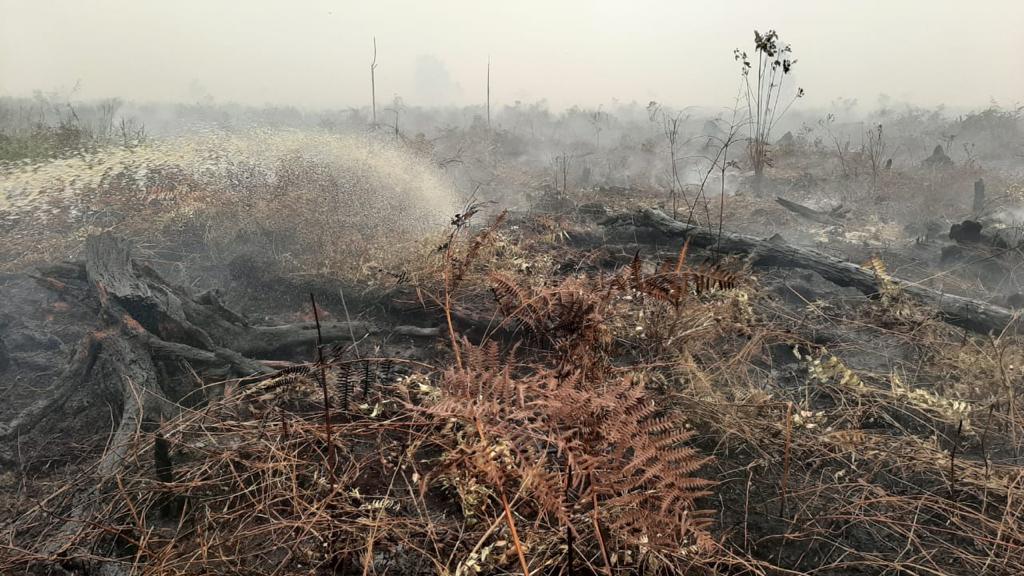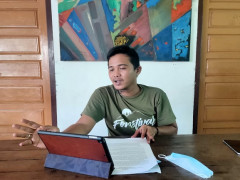Race against time
By Hairul SobriJambi Faces the Threat of COVID-19 and Smoke Disaster

The dark memory of forest and land fires in 2019
Rudi still remembers the dark and red sky in Sadu Subdistrict back in 2019. Now the fires are back and make him anxious. Peatlands in Sungai Sayang Village, Sadu Subdistrict, East Tanjung Jabung District were burned at the beginning of this year's dry season. Only a few kilometers from Rudi's house, thick smoke was again seen billowing into the sky. He is worried that the smog disaster that once choked him would happen again.
At that time, the fire spread wildly and burned thousands of hectares of peatlands in Sungai Remu Baku Tuo, Sungai Sayang, Sungai Jawi, Simpang Datuk, and Rantau Rasau Villages. His motorbike was also burned in the fire until only the frame was left.
Rudi said that at that time he wanted to go fishing in the Berbak Sembilang National Park. He left his motorbike near the bush on the edge of the embankment that separate the forest from the Simpang Datuk residents' rice fields. In the midst of the heat, a fire suddenly lit up and burned the remaining forest, surrounding the place where Rudi was standing. Rudy panicked and could only stand still.
“The fire was flying. I thought it was dead, but suddenly it was alive again," he said. Rudi was lucky, he survived even though his motorbike was destroyed by the fire.
Ahmad Tang, Rudi's friend who was fishing with him, was suffocated by the smog. He heard that the resident of Sungai Jambat Village suffered from acute asthma which relapsed when he was caught in the forest fire.
The Tanjung Jabung Timur area has more than 181,000 hectares of peatland and is very prone to fires. The Gabut Londrang Protected Forest, the largest peat conservation forest in Jambi Province with an area of 12,848 hectares, was burned down in the 2019 fire. The area is also part of the Mendahara River - Batanghari River Peat Hydrological Unit, covering the Jambi City, Tanjung Jabung Timur District, and Muaro Jambi District.
KKI Warsi data shows that 30,947 hotspots were detected in Jambi Province throughout 2019. It is around 13,000 lower than the number of hotspots in 2015. A total of 157,137 hectares of forest and land in Jambi were burned in 2019 and predicted to cause environmental losses of up to IDR 12 trillion.
Smoke disaster threat in the midst of the pandemic
In a different place, Abdullah almost collapsed. His chest was tight, his whole body felt weak, and his joints ached. He was short of breath not because of the smog, but because of the corona virus. The result of his swab test showed that he was positive for COVID-19. While having difficulties in breathing, Abdullah is worried that forest and land fires will occur when the COVID-19 situation in Jambi is still not under control.
Abdullah said that COVID-19 patients will be even more at risk if the haze disaster occurs. Abdullah hopes that the government can act faster and prepare special isolation rooms for COVID-19 patients to anticipate a spike in positive cases and the smog threat.
“They must ensure the availability of oxygen. If COVID and smog occur at the same time, the problem will be very serious," he said.
The Jambi Provincial Government has established an emergency status for forest and land fires from 23 March 2021 until the end of the dry season which is expected to last until next October.
The Regional Disaster Management Agency (BPBD) of Jambi Province noted that at least more than 25 hectares of land in PT Pelita Group was burned on Wednesday (4/8/2021). Hotspots were also seen in the Bukit Tigapuluh National Park, Sarolangun and Merangin Districts.
BPBD noted that at least 248 villages and three districts were considered as areas prone to forest and land fires. Muaro Jambi, Tanjung Jabung Timur, and Tanjung Jabung Barat Districts have the largest peatlands in Jambi that are prone to fire.
Feri Irawan, Coordinator of the Simpul Jaringan Pantau Gambut Jambi, is worried that a smog disaster will occur in the midst of the COVID-19 pandemic which has not slowed down. He asked the Governor of Jambi to focus on preventing forest fires.
Feri said the peatlands in Muaro Jambi, Tanjung Jabung Timur, and Tanjung Jabung Barat Districts had been degraded due to the activities of oil palm plantations, Industrial Plantation Forests (HTI), and logging concessions in natural forests (HPH).
Data from the Indonesian Forum for the Environment (WALHI) Jambi in 2019 stated that concession permits for oil palm plantations and HTI were granted for around 70 percent of the total 751,000 hectares of peatlands in Jambi.
Hundreds of canals were built by the companies to drain the peat. As a result, many peat domes are damaged and are now prone to fire. More than 154,000 hectares of land were burned in 2019, and 60 percent of it was peatlands. He stressed that peatland restoration activities, especially peat wetting, should be carried out by the companies immediately. Peat wetting is one of the most effective forest fire prevention efforts compared to manual fire suppression.
"The results of our field investigation show that 77% of the infrastructure is not found at 48 sample points in 8 companies in Jambi," he said.
Anticipation for the peak of forest and land fires
In a virtual meeting, the Minister of Environment and Forestry, Siti Nurbaya, asked all parties to monitor the hotspots that appear in areas prone to forest and land fires.
She emphasized that integrated patrols by involving the community need to be strengthened as a defense system to control forest and land fires as early as possible. So far, 185 command posts have been established to reach up to 555 villages around the posts.
The Minister implicitly asked to continue the capacity building for the Fire Care Community (MPA), which
now have their own paralegal group—a group of people who are trained to have legal awareness on the importance of protecting nature from fire and are subsequently involved in efforts to prevent and control forest and land fires.
She said that there were 12 MPA-Paralegal groups throughout Indonesia in 2020 and 28 groups are being proposed in 2021. So that by the end of this year, there will be 40 MPA-Paralegal groups.
Another effort made by the government to prevent forest and land fires is to use weather modification technology to make artificial rain in areas prone to forest and land fires.
In terms of law enforcement, the Indonesian Police have developed a criminal offense system. MoEF also has a law enforcement measure by giving warnings to oil palm plantations or other companies if hotspots appear in their locations.
Feri Irawan added that all the above efforts will be effective if the government consistently restores the peat ecosystem without compromise and prevents peat drainage activities that make peatlands prone to fire. The government needs to take full anticipation because the current dry season also coincides with the COVID-19 pandemic.
"It would be better if the new Jambi Governor just focuses on forest fire prevention. It's not the time to talk about Food Estate and other projects. The safety of Jambi people is more important," he said.



